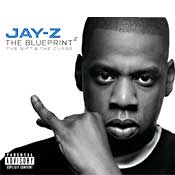
lyrics signify their seriousness, Jay-Z’s power lies in his unaffectedness. He often boasts that he improvises his work in the recording studio, and while the claim isn’t verifiable, his music possesses an offhand, smart-alecky ease. But ever since Jay-Z knocked P. Diddy out of mainstream hip-hop supremacy with 1998’s Vol 2: Hard Knock Life, this laid-back sensibility often slid into laziness. Great producers like the Neptunes, Kanye West, and Just Blaze masked Jay-Z’s weaknesses, but last year his shortcomings were laid bare when he offered a shallow, tepid response to “Ether,” Nas’s savagely smart critique of the rapper.
It would be a nearly unprecedented example of self-revelation in hip-hop if the title of Jay-Z’s seventh album, The Blueprint 2: The Gift & the Curse (a sequel to last year’s The Blueprint), alluded to the talent behind the boards being weighed down by the man in front of the mike. It doesn’t, of course (it’s just more Scarface-Godfather-inspired pomposity), but as they did on The Blueprint, producer Kanye West and his engineer Gimel “Young Guru” Keaton provide Jay-Z with emotionally charged music stitched together with samples from soul’s vulnerable, endlessly fertile “Hey Love” era in the seventies, leaving no doubt about who is the gift and who is the curse.
What a curse Jay-Z’s ideas represent: Nearly everything about The Blueprint 2 sounds like a retread, including its title; Dr. Dre’s coming onboard to sequelize “The Watcher,” a song from the Chronic 2001 album; and the album’s first single, “‘03 Bonnie & Clyde” – an update of Jay-Z’s own duet with Foxy Brown, “Bonnie & Clyde Part II,” now featuring Destiny’s Child’s Beyoncé Knowles. (Even its patina of flamenco-guitar playing seems borrowed; Jay-Z used a strikingly similar sound for his collaboration with R. Kelly, “Fiesta.”)The Blueprint 2 represents a kind of Hollywood-ization of hip-hop: the enormous breadth of the double-CD package, with its bonus tracks and its endless guest stars. Ever since the conversion to CDs, however, albums have been long in running time yet short on ideas. This vapid Blueprint is as good an example as any.
Few careers – in hip-hop or elsewhere – have had as many false starts and misdirected moments as Queens rapper Nas’s. After an impossibly virtuosic debut with Illmatic, which transformed street realism into lyrics so abstract they became a kind of psychedelic poetry, Nas took every wrong turn imaginable, hooking up with ludicrously derivative producers the Trackmasters and simply wasting his ample talents with songs either egomaniacally overblown (the chest-beating collaboration with P. Diddy “Hate Me Now”) and embarrassingly market-minded (the Sopranos-inspired “Got Ur Self A … “). In between these downturns, admirers of Nas have nourished themselves on the aforementioned “Ether” and his surprisingly powerful few verses on the otherwise lame superstar cover of “What’s Going On.” So it is thrilling, purifying, even in a down year like this, to witness Nas tap into the window-pane lucidity of his debut on his sixth album, God’s Son. Here, Nas is so fierce, so plainspoken, so lean with words, that he demolishes not just the oeuvre of our ruling rappers (yes, including Eminem’s) and recalls the music’s lyrical champs like Rakim, he even brings to mind hip-hop progenitors like Muhammad Ali in the “Rumble in the Jungle” era.
Like an agile boxer, Nas throws sharp, surprising left hooks on the album’s extraordinarily powerful first single, “Made You Look.” “This ain’t rappin’, this is street hop,” Nas warns – backed by a sparse, dusty-sounding drum loop that resembles the Incredible Bongo Band’s oft-sampled “Apache” – “Now get off your ass like your seat’s hot.” Nas even takes an easy shot at hip-hop’s pervasive materialism sting. “I’m six cribs deep, six bank accounts in six countries,” Nas spits sarcastically. “Nah, I’m lyin’ / who gives a fuck? / That’s so tired.”
But the sharp jabs and insults of God’s Son can’t compete with the album’s centerpiece, “Last Real Nigga Alive.” The song is framed by a familiar conceit – the up-from-the-streets tale – but it’s told in novelistic detail that few emcees would be able to summon. “It was my version of the blues,” Nas raps of his Illmatic days, “crack epidemic had rap representing the rules.” Nas doesn’t back off from discussing his more third-rail-like recent moments, like the alleged beating of his manager at the hands of P. Diddy (“Puff soaked Interscope offices with champagne bottles on Steve”), and he drops Jay-Z with a single lyric aimed at his competitors’ monied vanity. “I was Scarface,” Nas deadpans, “and Jay was Manolo.”Like pathbreaking projects past,God’s Son is not simply a great album, it’s a reminder of what we’ve been missing. Where OutKast’s Stankonia made connections between disparate musics in ways reminiscent of polymaths like Prince Paul, here Nas brings hip-hop back to the basics with a rough break-beat and a well-told story. This is the essence of punk; let’s see if Nas’s stripped-down rap starts a revolution.
Mariah Carey’s crimes against art are well-known and innumerable: She paved the way for the oversung and the underdressed, made hip-hoppers de rigueur for pop’s aspirants to street cred, and created a tradition of ballads so bleached out that they make Lionel Richie’s “Hello” seem like a paean to sadomasochism. All of these are on display on Charmbracelet, but what’s particularly, notably bad here is its production, all whimsical chimes and tinkling keyboards. Was Charmbracelet recorded in a Casio shop? This instrument – and Mariah’s – needs to be stopped.
Jay-Z
The Blueprint 2: The Gift & the Curse
(Roc-A-Fella/Island Def Jam)
Nas
God’s Son
(Columbia)
Mariah Carey
Charmbracelet
(Island Def Jam)